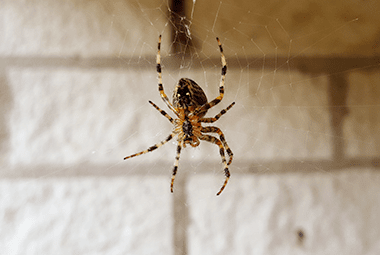Whether you are afraid of spiders or not, nobody wants to live with spiders in their home. Even those who aren’t necessarily fearful of the creepy, eight-legged creatures, most would say that they would rather not share their morning shower or watch evening TV with a spider hanging out in the corner. For those of us in Knoxville, the spiders that come into our homes are not only creepy but they can potentially be dangerous as well.
The most common types of spiders in Knoxville are the house spider, the black widow spider, the brown recluse spider, and the wolf spider. Common house spiders are yellow-white in color and have dark stripped markings on their bodies and legs. These spiders are a more of a nuisance—creating webs and crawling along your walls. They aren’t dangerous because their venom isn’t poisonous.
The black widow spiders are recognized by their black color with a red “hourglass” figure on their backs. A black widows venom is poisonous and attacks the nervous system of a human that has been bitten. Most know the black widow’s reputation as being deadly, however, death is very rare. It’s important that you seek medical attention as soon as you have been bitten to prevent serious injury.
Another poisonous spider is the brown recluse. These spiders are various shades of brown and are easily identified by the violin-shaped pattern on the top of their body. Also unique to them is their three pairs of eyes that are arranged in a semi-circle pattern. Brown recluse spiders don’t usually bite unless it’s during the process of being squashed or if being held. The bite will become infected and may cause fever and trouble sleeping. As with the black widow, please seek medical attention if bitten.
Last is the wolf spider, which are dark brown with light brown or yellow markings/stripes on their bodies. Their eyes are aligned in an odd way: four small eyes in the bottom row, two large eyes in the middle row, and two medium-sized eyes on the top. Wolf spiders don’t use webs to catch their prey—they hunt down and chase them. Despite this predatory nature, they are not aggressive towards humans. They will usually run and hide if they feel threatened. If they do bite, their venom isn’t strong enough to cause serious harm.
None of these spiders sound like anything you would want living in your home. Preventing these spiders from entering our homes is key. A few simple preventative measures that you can take on your own include blocking or sealing openings that spiders can fit through, taking care of your property including removal of woodpiles or leaves, installing door sweeps, and removing their webs.
If you want to guarantee that your house is protected you can call Russell Pest Control. Russell Pest Control has been protecting homes for over 45 years and knows the absolute safest, effective, and efficient techniques to keep spiders out of your home. With their year-round pest control plans, you receive scheduled visits that allow for protection all throughout the year. Their year-round plans also include a pest-free* guarantee, meaning they promise that no spiders will be joining you for family dinner.

